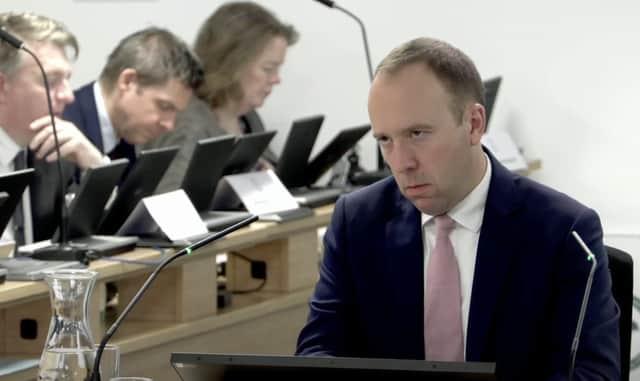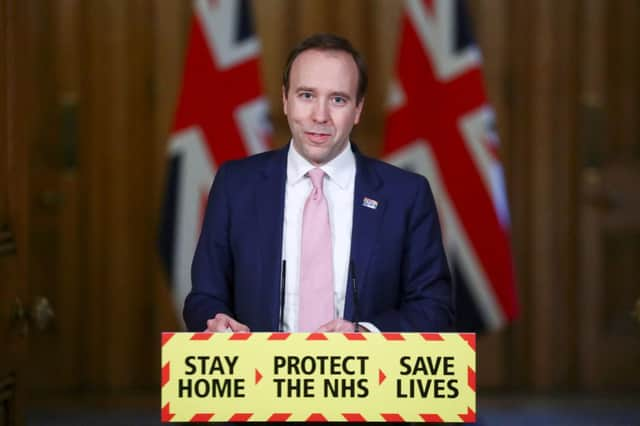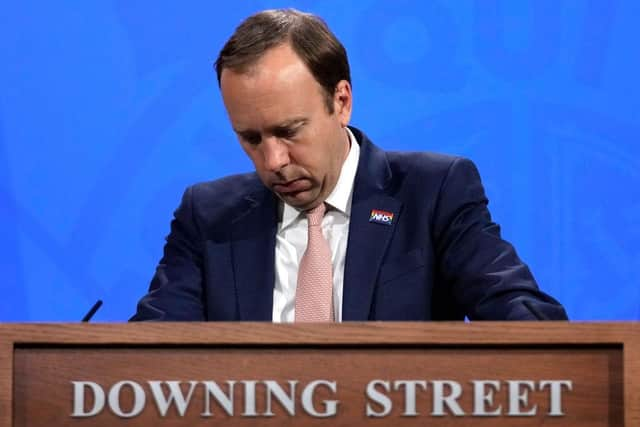Matt Hancock at Covid Inquiry: ex-Health Secretary evidence is a desperate attempt to dodge responsibility
and live on Freeview channel 276
“I don’t want to overplay it as I didn’t actually stop it,” Matt Hancock told the Covid Inquiry about the decision to axe community testing and contact tracing in early March 2020 “but I was sceptical we should stop these things”.
This was a rare lack of hubris from the former Health Secretary on the first of three days of evidence to the public inquiry, into what increasingly appears to be a disastrous government response to the pandemic. That self-reflection was only fleeting however before Hancock went back into his default mode of “it wasn’t me guv, honest”.
Advertisement
Hide AdAdvertisement
Hide AdAt this point, Hancock was responding to questions about the government’s policy to stop testing in the community and contact tracing on 12 March 2020 - 11 days before the belated decision to lock down. “I basically at this point had the confidence to say what I previously thought … what on earth are we doing stopping these things?” Hancock told the Inquiry.
However they did stop, despite apparent interventions from the Health Secretary, and this was the pattern for much of the day, Hancock, the new Captain Hindsight, trying to position himself on the right side of history.


Hancock's approach to the stand gave an air of confidence first thing this morning - he gave evidence to the inquiry earlier this year and sat up straight in his chair. But appearances can be deceptive.
Hugo Keith's line of questioning this morning focused on the UK's pandemic plan that was in place in early 2020. Developed in 2011, the plan was not adequate for something on the scale of Covid-19. As questioning continued, Hancock became more and more uncomfortable, after he was called upon to identify where government failings specifically laid.
Advertisement
Hide AdAdvertisement
Hide AdWhen asked about the plans, Hancock said: "With hindsight it would have been far better if I had said [to Cabinet] 'I really need your help, the plans we have are not up to it' but that wasn't what I thought or what I was being told at the time. The reason I held this confident view at that point is that we were the second best prepared county, and the best in the world in the sub category of rapid response to and mitigation of an epidemic.
"The World Health Organisation said the UK remained among the leaders worldwide in preparing for a pandemic. That is what I was being told at the time. I said to my cabinet colleagues that we would all have to get stuck in on this."


When asked for specifics, Hancock became more defensive with his responses - including claiming that every government department except his was "slow to get going" with Covid-19. But he refused to name specific departments or names, saying he "didn't want to point fingers."
Despite these claims about his own department’s response, Hancock’s own conduct in the early months of 2020 was clearly wanting. He revealed he didn’t bother reading the minutes from meetings of the Scientific Advisory Group for Emergencies (Sage) until mid February, instead relying on summaries.
Advertisement
Hide AdAdvertisement
Hide Ad"Did anyone know that the Secretary for Health was not reading the minutes day in day out from the sole Scientific Advisory Committee on Emergencies?" Keith asked him. "I don't know,” Hancock mumbled in response.


Hancock also said that the people at the “centre” were “actively working against” his plans to ramp up testing in the early days of the pandemic. He was desperately trying to ramp up to 100,000 tests a day, yet being thwarted by junior civil servants in No10. He, of course, denied accusations he was creative with the numbers to hit his self-imposed target, despite former Cabinet Secretary Mark Sedwill congratulating him for “creative counting” in black and white.
And on one of the biggest questions the Inquiry has been considering - why the UK locked down so late - Hancock was decisive. It should have happened on the 2 March, three weeks before the eventual date of Johnson’s famous TV address.
“I defend the actions that were taken by the government at the time, knowing what we did,” he said, “but with hindsight, that’s the moment we should have done it, three weeks, and it would have saved many, many lives.”
Advertisement
Hide AdAdvertisement
Hide AdHancock then claimed he called the Prime Minister on 13 March and, in a phone call which has no notes, urged him to lock down as soon as possible. This funnily enough was also missing from his book, the Pandemic Diaries, however now Matt the hero is on the right side of history again.
Watching Hancock’s evidence in isolation, you might think here’s a guy desperately fighting against government dysfunction to do the right thing. However, so many witnesses who’ve already given evidence have put him right at the heart of Johnson’s chaotic reign.
Deputy Cabinet Secretary Helen MacNamara said there was a “pattern” of “being reassured that something was absolutely fine” by Hancock before discovering it was “very, very far from fine”. She later said that he displayed “nuclear levels of overconfidence”.
While Dominic Cummings, who Hancock accused of presiding over a toxic culture in government, said he was “unfit for the job”. The chief adviser texted Johnson in May 2020, saying: “The incompetence, the constant lies, the obsession with media bullsh*t. Still no f*cking serious testing in care homes his uselessness is still killing God knows how many."
Advertisement
Hide AdAdvertisement
Hide AdAfter everything we’ve seen from Hancock, fake tears on daytime TV, I’m a Celeb and that CCTV footage, I think what most people wanted today was some contrition. However, for the most part that was sadly lacking. Instead, Hancock tried to rewrite history, history that none of us will forget.
Comment Guidelines
National World encourages reader discussion on our stories. User feedback, insights and back-and-forth exchanges add a rich layer of context to reporting. Please review our Community Guidelines before commenting.